- Home
- Bruce, Leo
Death of a Commuter
Death of a Commuter Read online
By the Same Author:
“Sergeant Beef” Novels:
Case for Three Detectives
Case without a Corpse
Case with No Conclusion
Case with Four Clowns
Case with Ropes and Rings
Case for Sergeant Beef
Cold Blood
“Carolus Deene” Novels:
At Death’s Door
Death of Cold
Death for a Ducat
Dead Man’s Shoes
A Louse for the Hangman
Our Jubilee is Death
Jack on the Gallows Tree
Furious Old Women
A Bone and a Hank of Hair
Die All, Die Merrily
Nothing Like Blood
Such is Death
Carolus Deene “Death” Novels:
Death in Albert Park
Death at Hallows End
Death on the Black Sands
Death at St Asprey’s School
Death on Allhallowe’en
Death on Romney Marsh
Death with Blue Ribbon
Published in 1988 by
Academy Chicago Publishers
213 West Institute Place
Chicago, Illinois 60610
Copyright © Leo Bruce, 1967
Printed and bound in the USA
No part of this book may be reproduced in any form without the express written permission of the publisher.
Library of Congress Cataloging-in-Publication Data
Bruce, Leo, 1903-1980
Death of a commuter.
I. Title.
PR6005.R673D43 1988 823′.912 88-24194
ISBN 0-89733-326-8 (pbk.)
To
Cameron Rougvie
whose thrillers thrill and
whose mysteries mystify
Chapter One
FIVE MEN OCCUPIED THEIR USUAL PLACES IN A FIRST-CLASS carriage, but the sixth place was empty.
This seemed to cause some disquiet to those present. One watched the platform, another glanced at his wristwatch. It was clearly an unusual occurrence.
Dogman broke the silence. He was sitting next to the empty place. His check suit and striped tie lacked the restraint evident in the dark suits of the others and no one welcomed his inquiry for it was unusual to exchange remarks until one pipe had been smoked and the newspaper read—about half-way to London. But Dogman, conventional though he might appear to others, had never quite conformed to the etiquette of group commuting.
“I wonder what’s happened to Parador,” he said brightly.
Thriver, a wizened solicitor frowned and picked up his paper. He had never approved of Dogman, a bookmaker, and did not know how he had managed to thrust himself into this company. But James Rumble was more polite.
“Overslept, perhaps,” he said gruffly. He was a partner in a large travel agency and considered rather a man of the world.
The brothers Limpole who occupied the other two seats said nothing at all. They never wasted words, or anything else.
The missing man, a certain Felix Parador, was a jaunty near-millionaire in his sixties, generous and popular but full of personal prejudices. It seemed to all of them extraordinary that he should be missing.
Every weekday morning since the end of the summer holiday season the six of them had shared this compartment on the 8.52, the fast city train from the new town of Brenstead. Every morning they had exchanged the same gruff scarcely audible greetings and indulged in a few words of general conversation towards the end of the journey. They knew one another’s little ways, how Thriver kept a small velvet pad in his overcoat pocket with which to re-polish his brilliant shoes as they came into London, how the elder Limpole, Charles, would read the paper through then hand it over to Edward to avoid the expense of two newspapers, how James Rumble smoked a pipe and Willy James Dogman a cheroot.
Perhaps if two of them met in Brenstead or in the presence of their wives there might be some chit-chat exchanged, or something as closely personal as an enquiry after health. But not in the morning. Not in that compartment. The nearest they had ever gone towards intimacy was an exchange of comments on last night’s television. Felix Parador did The Times crossword and made history one morning by asking Thriver to lend him a pencil or pen, accepting it with a silent nod. Yet when one of them was absent they were none of them at ease. Perhaps, though it was probably no more than a missed train, it reminded them of human mortality and the evanescence of their own lives, insisting to each uncomfortably that one morning his seat too, would be empty.
Then an unprecedented thing happened. The sliding door was pushed back and a man entered. He was a strange-looking man, too, dressed in black, with black tie and socks. If he had worn a silk hat he might have been an undertaker. Except for his heavy dark glasses. Undertakers do not wear dark glasses.
At first everyone was too dumbfounded to speak. Intruders were unheard of here. But when the man prepared to sit down Willy James Dogman found his voice.
“That seat’s taken,” he said.
The man had a curiously deep voice which made his words sound impressive.
“He won’t be coming,” he said.
No one pretended any longer to be immersed in his newspaper. But they left it to Dogman to go farther.
“What do you mean?” Dogman asked the intruder.
“Just that. He won’t be coming.”
Damnable to have to listen to someone wearing dark glasses. You can never tell whom, exactly, he’s addressing.
“How do you know?” asked Dogman.
The intruder hesitated a moment. The question seemed to have baffled him. Then he looked up to see that the train was beginning to move. He nodded towards the platform.
“Well, will he?” he asked.
This left everyone with the uncomfortable feeling that he had meant something else. Somehow one felt that this mysterious man knew who was missing, knew why he was not there, knew where he was.
Dogman bashed on regardless.
“Do you know Mr. Parador?” he asked.
“I didn’t know the gentleman’s name,” said the intruder.
“But you do now?”
“You’ve just told me.”
Dogman looked about him at the now preoccupied expressions on the faces of his travelling companions. What more was there to say? he seemed to ask. The intruder drew a folded newspaper from his pocket and began to read. It was the most uncomfortable journey any of them had ever passed.
Fifteen minutes from London, Dogman made an effort to rouse his fellow-travellers to their usual exchange of casual remarks.
“Hear about Hopelady and the bell?” Rev. George Hopelady was the Vicar of Brenstead and famous as a practical joker. “He muffled old Gobler’s bell before practice the other night and the poor old chap was nearly breaking his heart trying to make it chime.” Dogman made expressive gestures. “Pulling away,” he explained.
“Disgraceful. A minister,” said Charles Limpole.
“Oh well. You know Hopelady.”
“I certainly do not. He is not at all the sort of man I should wish to know. A mocking sort of fellow who holds nothing sacred.”
“We don’t attend the parish church,” Edward Limpole put in.
There were a few uneasy glances towards the intruder but he took no part in what little conversation there was and when the train came into the great London terminus of Padoria Cross he prepared to leave like the rest of them in silence. Before they had all left the carriage he had melted into the crowd intent on reaching their places of business.
“ ‘Straordinary, that fellow getting into our carriage,” said Thriver to Rumble as they walked towards the platform exit together.
�
�‘Straordinary,” agreed Rumble and left it at that. With a nod they parted.
Meanwhile Police Officer Brophy, as he insisted on being addressed, was wheeling his bicycle up Downaway Hill towards the Great Ring. This was a beauty spot ten miles from Brenstead which was famous not only in the district but throughout the south of England. Less beautiful than Chanctonbury Ring and less impressive than Stonehenge it still drew many visitors during the summer months to look out over the astonishing coloured map which England seemed to become from its height. The landscape was in some way etherealised from the Great Ring, its blotches wiped out, its pylons inoffensive, its roadside hoardings invisible, its corrugated iron roofs blending with tiled roofs and its bungalows concealed. One could believe England was still an agricultural country.
From the main road up Downaway Hill a narrower road ran to the parking place below the Great Ring. This was enormous but some cunning County Council official had had the wit to approve plans which made it invisible from the Great Ring itself. Moreover though the concession for a café had been applied for and there had been bitter correspondence in the local paper, no building was allowed and only a movable stall appeared on summer afternoons.
Police Officer Brophy reached the side-turning which led up to the Great Ring and hesitated. It was part of his patrol duties to inspect the car park and the Great Ring itself but he was anxious to reach the top of Downaway Hill where comfort awaited him at the back door of the The Three Thistles. But his conscience won and he made the ascent.
It was as well he did, he reflected later. For in the car park was a car, and in the car was a dead man.
Police Officer Brophy saw the car from a hundred yards away. He saw that it was red and frosted over, looking like a huge frosted cherry. It seemed to have been there for at least the most part of the night. Only when he opened the door beside the driving seat did he get the full shock of surprise because then the body of a middle-aged man, stiff as a poker as he said afterwards, almost fell in his arms.
Police Officer Brophy kept his head. Using considerable strength he pushed the stiff corpse back in its place and slammed the door. His duty was clear. First to inform, then to stand guard over the car until an investigating team should arrive. But to inform he would have to continue on his way to The Three Thistles since there was no other building in the neighbourhood.
It was nearing 10 a.m. when he reached the pub and knocked importantly on the door.
“Can I use your telephone, Mr. Diggs?” he asked, discouraging by the urgency in his manner any immediate offer of hospitality.
Police Officer Brophy knew that unfortunately Sergeant Beckett would be on duty, a man he particularly disliked for what he considered his petty and condescending superiority.
“Police Officer Brophy, here,” he said when he had got through.
“Yes, Brophy, what is it?” said Beckett hurriedly.
“I’m speaking from The Three Thistles public house …”
“Hotel,” put in Mr. Diggs.
“What are you doing there?” asked the sergeant.”
“I have just discovered in the car park of the Great Ring a frozen-over car with a dead man in it.”
“How do you know he’s dead?”
Brophy tried to keep his temper. “He was cold,” he said sulkily.
“So would you be if you’d been out at the Great Ring all night What’s he look like?”
“I didn’t wait to take notes on his appearance…”
“You should have. Young or old?”
“Middle-aged, I should say. I came to report the matter at once.”
“Better get back there and wait till the van comes. Shouldn’t be left even for a moment. You may find it gone when you get back, so don’t waste time now.”
Mr. Diggs shook his head in sympathy.
“That’s what they’re like,” he said. “Going to have a quick one?”
“It must be quick then,” said Brophy who knew that Mr. Diggs had allowed some customers to stay in the back room till nearly midnight.
“Short, you mean?”
“Have to be.”
“Scotch?”
“Gin. With a drop of pep in it. Anyone in last night, unusual, I mean?”
“Not to say unusual. No, there wasn’t. You mean about this you were phoning about? No, nothing I noticed. We had one or two in. Nothing special.”
“I expect you’ll be interrogated later.”
“Me? What for?”
“Nearest habitation. It’s my opinion there’s something dodgy about this. Very dodgy, if you ask me. Shouldn’t be surprised if we had a big case on our hands.” Then, somewhat inconsequently, “He was as stiff as a poker. Must have been there all night.”
“We never heard anything,” said Mr. Diggs. “You’d think we would have, wouldn’t you? It can’t be more than a quarter of a mile away. You don’t mean you think it was murder or anything like that?”
“I’m not giving any opinion at the moment. I must be getting back.”
Police Officer Brophy was able to freewheel back to the side road which led to the Great Ring and was relieved to see that the car was where he left it. Moreover as he saw by peering in, the corpse was still at the driving seat. There was nothing to do now but wait for the van.
It was twenty minutes before he saw the cavalcade approaching—an ambulance and two cars.
“Looks to me like murder, Sir,” he ventured to remark to Sergeant Beckett.
The sergeant did not bother to answer this, but giving Brophy what is aptly called a withering look he strode forward to the red car. Brophy prepared to watch the intricate proceedings which he knew would follow, doctor’s examination, photographs, fingerprint check, a search of the car and of the dead man’s pockets and person before the body would be sent in for more careful examination. But he didn’t see all this.
“Go down to the road, Brophy, and don’t let anything up here at all,” said Beckett heartlessly, and Brophy turned to obey. You had to be a long time in the police, he reflected bitterly, before you were good enough to handle a corpse.
News, when it reached him in the canteen from a police officer younger than himself who had had nothing to do with finding the cadaver, was disappointing. The body was that of a man named Felix Parador who had not been home since he left for London on the previous morning. His wife had not expected him home last night as he had telephoned to say he would stay in town, but the man in charge of the car park at the station had seen him drive away after the train in at 6.45.
It appeared that he had driven out to the Great Ring for some reason and there quietly taken an overdose of antibiotic sleeping pills called Opilactic, since an empty bottle which had contained these was beside him and one of the pills was even found on the floor. He also had in his right hand a silver drinking-flask which had contained whisky and it was thought that he had used this to help him swallow the pills. It was impossible to say at what time he had died last night but medical opinion put it somewhere between eight and eleven. The official police opinion was, Brophy heard from his friend who confided it in a low voice, that the man had committed suicide. No reason for it had as yet been hazarded but there had been some talk in Brenstead about his wife.
Police Officer Brophy felt indignant at having been left out of this.
“Who found the bloody thing? That’s what I should like to know!” he exclaimed rhetorically. “That’s what you get for being conscientious. Next time I shall let them find it themselves!”
His friend looked serious.
“How do you know there’ll be a next time?” he asked, and his words were remembered later.
The evening papers carried a short account of the event, part news paragraph, part obituary. Mr. Felix Parador of The Old Manor, Brenstead … company director (that useful term used for any petty criminal or for millionaire initiators of take-over bids) found early this morning … the Norsex police say foul play not suspected … A few lines of shrugging and impersonal r
eading matter while even then preparations were being made for a post-mortem.
The Norsex police might not suspect foul play but the people of Brenstead considered themselves less simple-minded. ‘It stands to reason,’ they said, and ‘Who’s going to believe?’ they asked. There was a certain amount of wishful thinking in this for little is more teasing than to have a promising piece of sensational scandal dashed before it was fairly started. There must have been more to it than that, they said. Why, they had seen Mr. Parador only that morning or the previous day and he had said nothing then. And what about Mrs. Parador? Everyone knew about her. And if he wanted to commit suicide why should he go out to the Great Ring? That was the question.
Perhaps the inquest would tell something. It was held two days later in the ballroom of The Royal Oak. The coroner, a dignified but shrewd individual who asked searching questions, heard the medical evidence unmoved. Death had been caused by an overdose of the drug which was the basic ingredient of Opilactic. The doctors who had carried out the post-mortem had no doubt of that. As to the time of death they admitted uncertainty. The dose must have been a massive one, so many grammes of so and so and a lot of technical terminology about ‘the organs’. The widow, who was offered every consideration and the sympathy of the court, had no explanation of her husband’s conduct. He had been in excellent spirits when he left her that morning. No, she had not been surprised when he telephoned from his office to say he would not be home for the night. He had done that on previous occasions, though not lately. She was surprised to hear he had come down on his usual train after all without letting her know. He was very punctilious in such matters.
His brother, Magnus Parador, had been more truculent. His brother’s affairs had been in excellent order and he for one did not believe that Felix would ever have committed suicide, unless he had become suddenly deranged, which was most unlikely. He was the sanest man Magnus Parador had ever known. But had he not been a prisoner of the Japanese for two years? Yes, but there were no ill effects of that noticeable now.
The only evidence which seemed to help the coroner was that of a clerk in Parador’s office, Philip Dukes. Yes, he thought Mr. Parador had behaved oddly that afternoon. He had taken the wrong hat and finding it far too small for him had larked about in it before returning it to its hook. What did he mean by larking about? Well, he had put it on his head, grinned to him, Dukes, and seemed to make a joke of it. No one else had noticed this, but it was enough for the coroner. The verdict was Suicide While the Balance of his Mind was Disturbed. Foul play, it was seen, was not suspected and the post-mortemised body of Felix Parador was buried in an honourable grave. The five men who travelled daily with him looked out for a candidate for his seat in the compartment. Slowly and unwillingly the people of Brenstead turned to other matters.

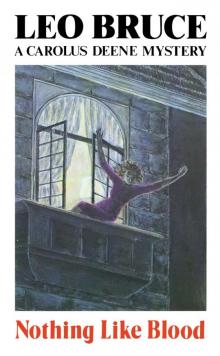 Nothing Like Blood
Nothing Like Blood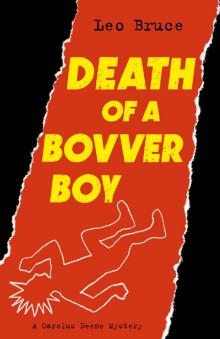 Death of a Bovver Boy
Death of a Bovver Boy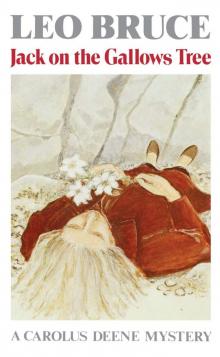 Jack on the Gallows Tree
Jack on the Gallows Tree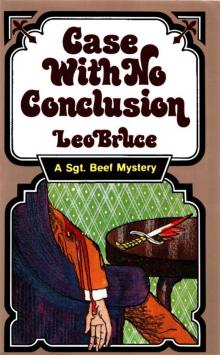 Case with No Conclusion
Case with No Conclusion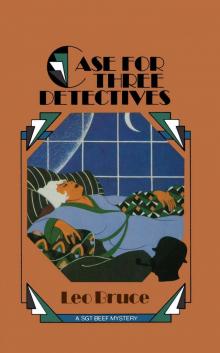 Case for Three Detectives
Case for Three Detectives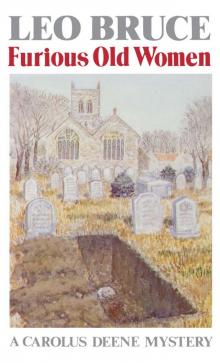 Furious Old Women
Furious Old Women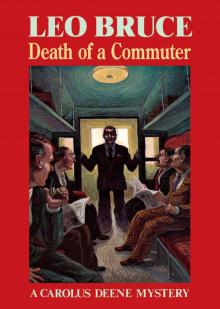 Death of a Commuter
Death of a Commuter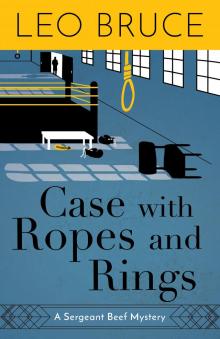 Case with Ropes and Rings
Case with Ropes and Rings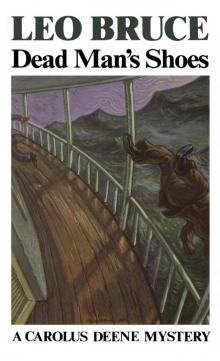 Dead Man’s Shoes
Dead Man’s Shoes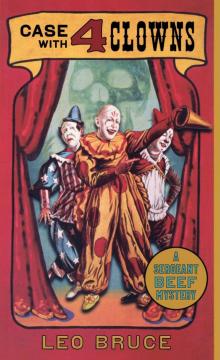 Case with 4 Clowns
Case with 4 Clowns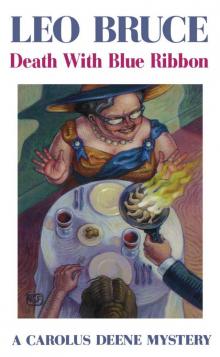 Death with Blue Ribbon
Death with Blue Ribbon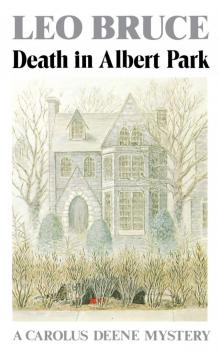 Death in Albert Park
Death in Albert Park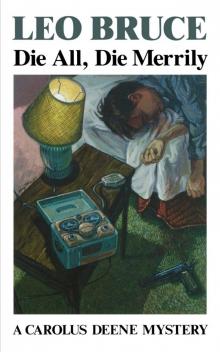 Die All, Die Merrily
Die All, Die Merrily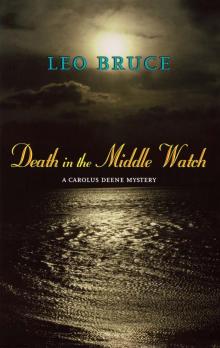 Death in the Middle Watch
Death in the Middle Watch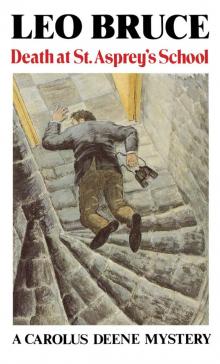 Death at St. Asprey’s School
Death at St. Asprey’s School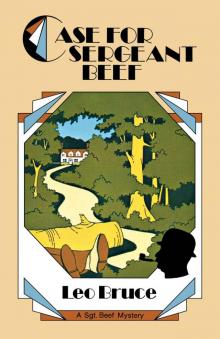 Case for Sergeant Beef
Case for Sergeant Beef